用新概念51-56课课件
合集下载
Lesson56(课件)新概念英语第一册

nice [naɪs]
adj. 美好的
meet [miːt]
v. 遇见
Japanese [ˌdʒæpə'ni:z] 日本的;日本人
Korean [kə'riən] 韩国的;韩国人
Chinese [tʃaɪniːz] 中国的;中国人
too
[tuː] adv. 也
PPT模板下载:/moban/ 节日PPT模板:/jieri/ PPT背景图片:/beijing/ 优秀PPT下载:/xiazai/ Word教程: /word/ 资料下载:/ziliao/ 范文下载:/fanwen/ 教案下载:/jiaoan/ 字体下载:/ziti/
行业PPT模板:/hangye/ PPT素材下载:/sucai/ PPT图表下载:/tubiao/ PPT教程: /powerpoint/ Excel教程:/excel/ PPT课件下载:/kejian/ 试卷下载:/shiti/
Thank
you!
PPT模板下载:/moban/ 节日PPT模板:/jieri/ PPT背景图片:/beijing/ 优秀PPT下载:/xiazai/ Word教程: /word/ 资料下载:/ziliao/ 范文下载:/fanwen/ 教案下载:/jiaoan/ 字体下载:/ziti/
行业PPT模板:/hangye/ PPT素材下载:/sucai/ PPT图表下载:/tubiao/ PPT教程: /powerpoint/ Excel教程:/excel/ PPT课件下载:/kejian/ 试卷下载:/shiti/
Mr. [‘mistə]
先生
Miss [mɪs]
小姐
Good [gʊd]
Listen to the tape and do the exercises
新概念第二册Lesson 56 (共27张PPT)
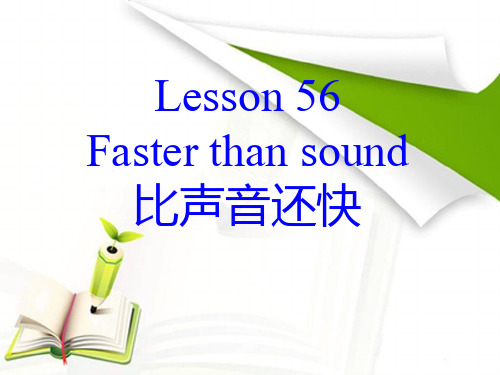
• A lot of cars entered for this race last year and there was a great deal of excitement just before it began. • enter for 报名参加 • a great deal of +不可数名词 大量的…… • a great number of +可数名词 • a great many +可数名词 许多…… • a large amount of +不可数名词 • just before中的just 起强调作用
• • • • • • • •
Once a year, a race is held for old cars. =Old car race is held once a year. once +表示时间的名词 每……一次 邮递员一天来一次。 The postman calls once a day. be held for 为……而举行 明天要召开一个会议来讨论这个问题。 A meeting will be held for discussing the problem.
• A few cars, however, completed the race. The winning car reached a speed of forty miles an hour -- much faster than any of its rivals. • the wining car 获胜车 • a speed of +数量词 速度为…… • much faster 快得多;a little faster 快一点 • any of its rivals=any rival 任何一个 • any 在比较级中一旦出现, 要加可数名词的单数 • 北京比其他城市都要大。 • Beijing is bigger than any other city. • 如果是不定代词, 可以说someone else, anyone else
新概念英语第二册Lesson 56(共26张PPT)
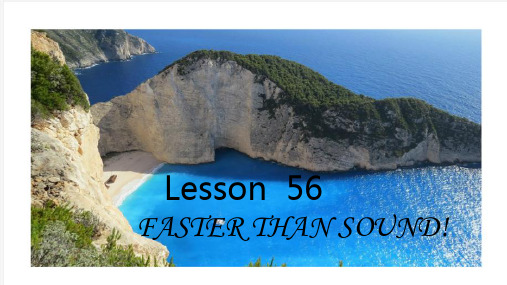
finally found a job at a local company. • A struggling B struggledC having struggled D to struggle • 被动:6(北京改) ___ twice, the postman refused to deliver
13
• (全国卷) With Father’s Day around the corner, I have taken some money out of the bank_________presents for my dad
• A. buy B. to buy C. buying D. to have bought • 非谓语动词作状语 • 主动: • 非谓语动词作状语 • 主动: • to do ( 之后) • doing (同时) • having done (之前)
• “ 大量的”=a lot of • A large number of • A great many
• A large amount of • A great deal of
10
• One of the most handsome cars was a Rolls-Royce Silver Ghost. The most unusual car was a Benz which
• 必考词组: have trouble/difficulty/problems/fun+doing • I had difficulty finding a place to live • Did you have any trouble getting a visa? • 寻宝很快乐 • 我去说服他很困难 • 我遇到困难去解开这个谜
13
• (全国卷) With Father’s Day around the corner, I have taken some money out of the bank_________presents for my dad
• A. buy B. to buy C. buying D. to have bought • 非谓语动词作状语 • 主动: • 非谓语动词作状语 • 主动: • to do ( 之后) • doing (同时) • having done (之前)
• “ 大量的”=a lot of • A large number of • A great many
• A large amount of • A great deal of
10
• One of the most handsome cars was a Rolls-Royce Silver Ghost. The most unusual car was a Benz which
• 必考词组: have trouble/difficulty/problems/fun+doing • I had difficulty finding a place to live • Did you have any trouble getting a visa? • 寻宝很快乐 • 我去说服他很困难 • 我遇到困难去解开这个谜
新概念英语第一册 Lesson 51-52课 (共40张ppt)

rainy [ˈreɪni ] 下雨的(形容词) 广州的夏天经常下雨。 =It’s often rainy in summer in Guangzhou.
overcast /ˈəʊvəˌkæst/ 阴天的 drizzle /ˈdrɪzəl/ 毛毛雨 shower /ˈʃaʊə/ 阵雨 downpour /ˈdaʊnˌpɔː/ 暴雨 blizzard /ˈblɪzəd/ 暴风雪 fog /fɒɡ/ 雾 haze /heɪz/ 雾霾 breeze /briːz/ 微风 hurricane /ˈhʌrɪkən, -keɪn/ 飓风 typhoon /taɪˈfuːn/ 台风 tornado /tɔːˈneɪdəʊ/ 龙卷风 storm /stɔːm/ 暴风雨 thunder /ˈθʌndə/ 雷
1-19,除第1-3,其余均在末尾加 th,但5、8、9、12的写法特殊。
第20-90,整数,基数词尾y变i,再 加eth.
两位数的词,将个位变成序数词, 三位数则将后两位变成序数词。
一月二号 January 2/Jan.2 January the second 二月20号 February 20(th)/Feb.22(th) February the twentieth
China Russia England Canada Austrilia Japan India America Brazil Holland France
Chinese Russian English Canadian Austrilian Japanese Indian American Brazilian Dutch French
hail /heɪl/ 冰雹 frost /frɒst/ 霜 lightning /ˈlaɪtnɪŋ/ 闪电
overcast /ˈəʊvəˌkæst/ 阴天的 drizzle /ˈdrɪzəl/ 毛毛雨 shower /ˈʃaʊə/ 阵雨 downpour /ˈdaʊnˌpɔː/ 暴雨 blizzard /ˈblɪzəd/ 暴风雪 fog /fɒɡ/ 雾 haze /heɪz/ 雾霾 breeze /briːz/ 微风 hurricane /ˈhʌrɪkən, -keɪn/ 飓风 typhoon /taɪˈfuːn/ 台风 tornado /tɔːˈneɪdəʊ/ 龙卷风 storm /stɔːm/ 暴风雨 thunder /ˈθʌndə/ 雷
1-19,除第1-3,其余均在末尾加 th,但5、8、9、12的写法特殊。
第20-90,整数,基数词尾y变i,再 加eth.
两位数的词,将个位变成序数词, 三位数则将后两位变成序数词。
一月二号 January 2/Jan.2 January the second 二月20号 February 20(th)/Feb.22(th) February the twentieth
China Russia England Canada Austrilia Japan India America Brazil Holland France
Chinese Russian English Canadian Austrilian Japanese Indian American Brazilian Dutch French
hail /heɪl/ 冰雹 frost /frɒst/ 霜 lightning /ˈlaɪtnɪŋ/ 闪电
新概念第二册Lesson 56 (共27张PPT)

excitement n. 激动, 兴奋
• to one's excitement… 令某人激动的是…… • To everyone’s excitement, though it was very difficult, he won the prize. • 令大家激动的是,尽管很难,但是他仍然赢得 了那个奖项。 • The most exciting thing is that… • 最令人激动的是…… • The most exciting thing is that he wins the first prize.
• explode • vt. 使爆炸;vi. 爆炸, 爆发, 破除, 推翻, 激发 • 乔治发现她脸色不好,决定最好在她爆发之 前离开。 • George caught the look and decided that he had better leave before she exploded. • bomb • n. 炸弹;vt. 投弹于, 轰炸 • 炸弹爆炸了。 • The bomb exploded.
• • • • • • •
③ adj. 等于reasonable 合理的, 讲道理的,(身体)好的 His body was still sound. I have a piece of sound advice. 我有一个合理的建议。 soundly adv. 香甜的 sleep soundly
handsome adj. 漂亮的, 美观的
• 一般与男孩子连用,形容男孩, 英俊;与人连用有阳 刚的美,与物相连表示美观大方,并表示制作精良; 跟女性连用的时候就表示这个女孩子有阳刚气,类 似女侠的概念。 • Your husband is handsome. • He gives me a handsome present. • She is a handsome policewoman. • beautiful 形容人的时候表示内在和外在美的统一, 完 美的概念 。 • You look beautiful. • Flowers are beautiful.
(完整版)新概念第一册51-52精品课件

3. in summer在夏天
4. in autumn在秋天
5. in winter在冬天
5. warm [wɔ:m] 暖和的
春天暖和。 It’s warm in spring.
6. hot [hɒt] 热的
夏天热。 It’s hot in summer.
7. cool [ku:l] 凉快的 秋天凉快。 It’s c三月 April四月 May五月
spring n. 春天
/sp riŋ/
春天的天气怎么样? What’s the weather like in spring?
三月份经常刮风。windy刮风的
It’s often windy in March.
四月、五月总是很暖和。warm暖和的 It’s always warm in April and May.
9. weather [ˈweðə] 天气 春天的天气怎么样? What’s the weather like in spring? 暖和的。 It’s warm.
9. weather [ˈweðə] 天气 夏天的天气怎么样? What’s the weather like in summer? 总是很热。 It’s always hot.
8. cold [kəʊld] 冷的
冬天冷。 It’s cold in winter.
summer winter spring autumn
9. weather [ˈweðə] 天气
What’s the weather like today? 今天的天气怎么样?
It’s hot. 很热。
like此时不表示 “喜欢”,而是 做介词,表示 “像”
It’s often cloudy in autumn. 秋天多云。
新概念一册51课经典课件.ppt
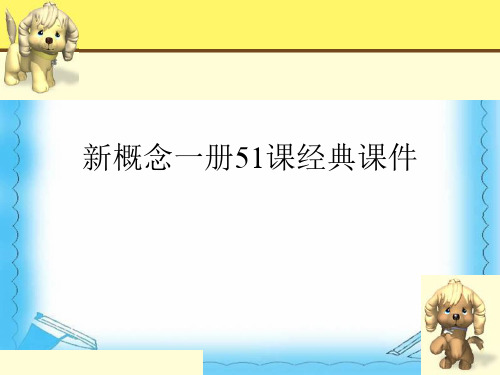
n. 气候
长时间的天气状况或 数年间的天气情况
weather n. 天气
某一特定时间内的各种 天气变化,比如说:风、 雪、阴、晴等
e.g. -What’s the weather like today? -It’s a fine day today.
e.g. -What’s the climate like in your country(国家)?
__M_a_y_, but it rains sometimes.
Rain
• summer
Hot
• It's always hot in __J_u_n, e___J_u_alynd____A_u_g. ust • The sun shines every day.
shine
• autumn
warm
• It's always warm in __S_e__p_t_e_m__b_earnd ____O__c_t_o_b. er • It's often cold in __N_o__v_e_m_ abnedrit rains sometimes.
Cold
• winter
Very Cold
• It's often cold in__D__e_c_e_m_ b, _e_r_J_a_n_u__aarnyd ____F_e__b_r.uary • It snows sometimes.
一 I wash the dishes every day. 般 You sometimes take a bus 现 home.
在 They usually have lunch at 时 11:30.
的 She often helps others.
长时间的天气状况或 数年间的天气情况
weather n. 天气
某一特定时间内的各种 天气变化,比如说:风、 雪、阴、晴等
e.g. -What’s the weather like today? -It’s a fine day today.
e.g. -What’s the climate like in your country(国家)?
__M_a_y_, but it rains sometimes.
Rain
• summer
Hot
• It's always hot in __J_u_n, e___J_u_alynd____A_u_g. ust • The sun shines every day.
shine
• autumn
warm
• It's always warm in __S_e__p_t_e_m__b_earnd ____O__c_t_o_b. er • It's often cold in __N_o__v_e_m_ abnedrit rains sometimes.
Cold
• winter
Very Cold
• It's often cold in__D__e_c_e_m_ b, _e_r_J_a_n_u__aarnyd ____F_e__b_r.uary • It snows sometimes.
一 I wash the dishes every day. 般 You sometimes take a bus 现 home.
在 They usually have lunch at 时 11:30.
的 She often helps others.
新概念英语第一册第51-52课课件

e.g.-What’s the house like? -It’s so beautiful.
询问气候/天气状况除了用 What's the weather/ climate like? 也可以用 =How is the weather/climate ? 回答用It's + 形容词(形容天气的)
3. country
/ 'kΛn tri /
n. 国家
复数 countries
-Which country do you come from? -Where do you come from?
n. 乡村 in the country 在乡村
-I come from China.
4. Greece / g r i: s /
adj.刮风的
It rains sometimes.
v.下雨
6. summer
/'sΛmә/
n. 夏天
June July August
It’s often hot.
adj.严热的
The sun shines every day.
v.照耀
7. autumn /'כ:təm/
n. 秋天
September October November
3.How many months are there in spring? What are they?
HANS: Where do you come come from= be from 来自 ❀ = Where are you from?(答:I'm + 国家) from? DIMITRI: I come from Greece.
新概念第一册51-52课L51-52课详细课件

every day always often sometimes seldom never
我们每天都喝牛奶。 Every day we drink milk. 我们总在下午上英语课。 We always have English classes in the afternoon. 她通常下课后打篮球。 She usually plays basketball after school. 他经常坐公共汽车上学。 He often goes to school by bus.
It’s cloudy.
DIMITRI: It’s very pleasant.
climate
气候 (一个大面积地区
长时间的天气状况)
weather
的天气)
天气 (小地区短时间
It’s often windy in March It’s always warm in April and May It rains sometimes
• 表示通常性、规律性、习惯性的状态或 者动作的一种时态,常与always, often, never, usually, sometimes, every day 等连用。 • always often sometimes(be后实 前) • every .......
在描述一个动作多久发生一次时,可以用以下这些词:
Where does he come from? He comes from_the US_.
Where does she come from? She comes from_England. Where does it come from? It comes from___Japan_____.
Summary
我们每天都喝牛奶。 Every day we drink milk. 我们总在下午上英语课。 We always have English classes in the afternoon. 她通常下课后打篮球。 She usually plays basketball after school. 他经常坐公共汽车上学。 He often goes to school by bus.
It’s cloudy.
DIMITRI: It’s very pleasant.
climate
气候 (一个大面积地区
长时间的天气状况)
weather
的天气)
天气 (小地区短时间
It’s often windy in March It’s always warm in April and May It rains sometimes
• 表示通常性、规律性、习惯性的状态或 者动作的一种时态,常与always, often, never, usually, sometimes, every day 等连用。 • always often sometimes(be后实 前) • every .......
在描述一个动作多久发生一次时,可以用以下这些词:
Where does he come from? He comes from_the US_.
Where does she come from? She comes from_England. Where does it come from? It comes from___Japan_____.
Summary
新概念英语第二册56课完整ppt课件
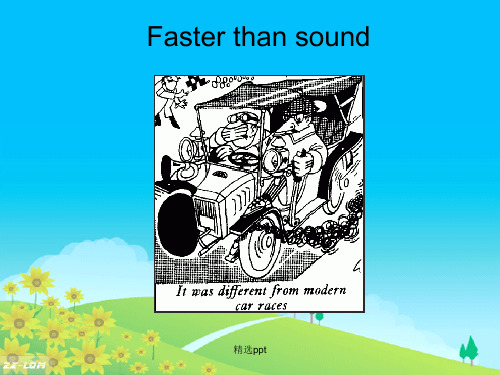
Faster than sound
精选ppt
sound
Faster than sound • ① n. 声音
• sound n. 任何声音都可以 • voice n. 人的声音 • noise n. 和周围不和谐的声音, 噪音
• ② v. 听起来 sound like听起来像 • He sounds like a little boy. • That sounds good. • ③ adj. 等于reasonable • 合理的, 讲道理的,(身体)好的 • His body was still sound. • I have a piece of sound advice. • soundly adv. 香甜的 • sleep soundly
• beautiful 形容人的时候表示内在和外在美的统一, 完美 的概念
• You look beautiful.
• Flowers are beautiful.
精选ppt
• pretty adj. 美丽(用于女孩或小孩),有柔美的意思 • pretty跟男性连用就表示没有阳刚气,女性化 • Your wife is pretty. • pretty boy / pretty girl / pretty woman
season.
• bomb • n. 炸弹;vt. 投弹于, 轰炸 • The bomb exploded.
精选ppt
• course n.跑道,行程,进程
• Many of the cars broke down on the course and some drivers spent more time under their cars than in them!
精选ppt
sound
Faster than sound • ① n. 声音
• sound n. 任何声音都可以 • voice n. 人的声音 • noise n. 和周围不和谐的声音, 噪音
• ② v. 听起来 sound like听起来像 • He sounds like a little boy. • That sounds good. • ③ adj. 等于reasonable • 合理的, 讲道理的,(身体)好的 • His body was still sound. • I have a piece of sound advice. • soundly adv. 香甜的 • sleep soundly
• beautiful 形容人的时候表示内在和外在美的统一, 完美 的概念
• You look beautiful.
• Flowers are beautiful.
精选ppt
• pretty adj. 美丽(用于女孩或小孩),有柔美的意思 • pretty跟男性连用就表示没有阳刚气,女性化 • Your wife is pretty. • pretty boy / pretty girl / pretty woman
season.
• bomb • n. 炸弹;vt. 投弹于, 轰炸 • The bomb exploded.
精选ppt
• course n.跑道,行程,进程
• Many of the cars broke down on the course and some drivers spent more time under their cars than in them!
新概念英语第一册第51-52课课件
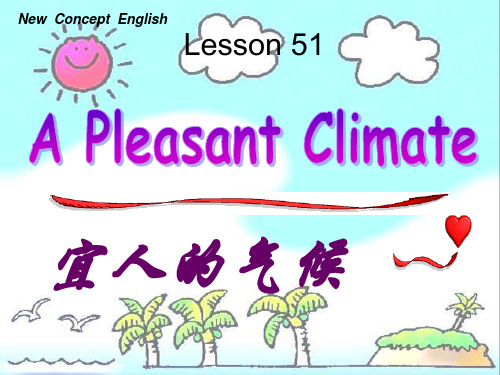
e.g.-What’s his brother like? -He is very handsome.
e.g.-What’s the house like? -It’s so beautiful.
HANS: What's the weather like in spring?
❀ climate: 长时间的天气状况或数年间 的天气情况。 ❀ weather:某一特定时间内的各种天气 变化,比如:风、雪、阴、晴等。 ❀ 季节前面没有冠词。
❀ it: 指代weather。
The sun shine every day.
❀ 注意冠词a/an/the的使用及区别 (1)、冠词分为定冠词和不定冠词; (2)、不定冠词有2个,分别是a和an; (3)、以辅音发音开头的单词前,用a; e.g. a dog 以元音发音开头的单词前,用an; e.g. an orange (4)、定冠词有1个,是the; (5)、在特指和全世界独一无二的事物 的情况下,要在此名词前用定冠词the; (6)、上文没有提到,文中第一次提到, 表示泛指,用不定冠词a/an; (7)、上文提到过,文中再一次提到, 表示特指,用定冠词the。
January (Jan.)
March(Mar.)
February(Feb.)
April(Apr.)
May
July
June
August(Aug.)
September (Sept.)
November(Nov.)
October(Oct.)
December(Dec.)
Listen to the tape and answer the question:
❀ = I'm from Greece.
新概念英语一册51-52课课件

-Where do they come from? =Where are they from? - They come from England.
=They are from England.
-What nationality are they? -He is English.
What’s the weather like in spring?
•季节、月份、年前用介词in • often:常常,频率副词,用在be动词后,实义 动词前 eg:她常常六点吃晚饭。 She often eats dinner at 6 p.m.
•always:总是,频率副词,用在be动词后, •实义动词前 eg:你总是给我买肉吃。 You always buy meat for me.
English
• Germany
German
France French
Holland
Dutch
Brazil Brazilian
Italy Italian
Spain Spanish
Norway Norwegian
Russia Russian
Sweden
Swedish
询问国籍: What nationality are they ? They are American.
What’s the climate like in your country?
DIMITRI: It’s very pleasant.
↓
What is the weather like today? It’s cloudy.
HANS: Where do you come from? DIMITRI: I come from Greece. Come from :=be from,来自 Eg:-他们来自哪里? -他们来自英国。
新概念英语第一册51-52参考课件

/'plezənt/ adj. 宜人的
New words
Greece n. the U.S. n. Brazil n. England n. France n. Germany n. Italy n. Norway n. Russia n. Spain n. Sweden n. Holland n.
December , It's often cold in________ January ________and ________. February snows sometimes. It ______
Spring: often windy ; always warm ;rains sometimes Summer: always hot;The sun shines every day. Autumn/Fall: always warm;often cold;rains sometimes
Winter: often cold;snows sometimes
Key sentences: What's the weather/cliamte like? Is it...?
n. n. n. n. n. n. n. n.
希腊 气候 天气 国家 春天 夏天 秋天 冬天
1. spring 2. country 3. weather 4. climate 5. Greece 6. winter 7. autumn 8. summer
Warming-up
snow
rain
Weather
sun wind
cloud
strom
What's the weather like in the picture?
New words
Greece n. the U.S. n. Brazil n. England n. France n. Germany n. Italy n. Norway n. Russia n. Spain n. Sweden n. Holland n.
December , It's often cold in________ January ________and ________. February snows sometimes. It ______
Spring: often windy ; always warm ;rains sometimes Summer: always hot;The sun shines every day. Autumn/Fall: always warm;often cold;rains sometimes
Winter: often cold;snows sometimes
Key sentences: What's the weather/cliamte like? Is it...?
n. n. n. n. n. n. n. n.
希腊 气候 天气 国家 春天 夏天 秋天 冬天
1. spring 2. country 3. weather 4. climate 5. Greece 6. winter 7. autumn 8. summer
Warming-up
snow
rain
Weather
sun wind
cloud
strom
What's the weather like in the picture?
新概念第二册51-52课课件

CHAPTER
05
写作技巧训练
写作技巧讲解
写作技巧
写作风格
学习并掌握常用的写作技巧,如比喻、拟 人、排比等,以提高文章的表现力和感染 力。
了解不同风格的写作特点,如清新自然、 华丽绚烂、简洁明快等,以便根据文章内 容和读者需求选择合适的风格。
文章结构
语言表达
掌握文章的基本结构,包括开头、正文和 结尾,以及如何合理安排段落和布局整体 结构。
词组
in recognition of、be characteristic of
扩展词汇
describe v.描述、形容; recognize v.识别、认出; characteristic adj.特有的、独特 的;recognition n.识别、认识 ;in recognition of 承认……
重点语法点1
现在完成时态的用法。现在完成时态表示过去发生的动作对现在的影响或结果 ,常与already, just, yet等副词连用。
重点语法点2
现在完成进行时态的用法。现在完成进行时态表示过去某个时刻开始一直持续 到现在的动作,常与for+时间段、since+时间点等连用。
语法练习题
练习题1
用现在完成时态填空。
新概念第二册51-52课 课件
CONTENTS
目录
• 课文内容梳理 • 语法知识讲解 • 听力技巧训练 • 阅读技巧训练 • 写作技巧训练
CHAPTER
01
课文内容梳理
课文重点词汇
重点词汇
describe、recognize、 recognise、describe、 characteristic、describe、 recognition、characteristic
新概念一册51课经典课件

迪米特里:6月、7月和8月 的天气总是炎热的
迪米特里:9月和10月总是 很暖和,
迪米特里:12月、1月和2 月常常很冷,有时还下雪。
I'm a weather reporter!
我是小小天气播报员
Where do you come from? I come from ________. What’s the weather like in ______?
Very Cold
It's often cold in__D__e_c_e_m_ ,b_e_r_J_a__n_u_anryd _____F_e_b_.ruary It snows sometimes.
Snow
Spring: often windy ;always warm ; rains sometimes
2.How many months are there in spring? What are they?
3.Is it hot or cool in summer? 4.Does it ever snow in winter?
Listen to the tape and answer these questions:
二三月月过三春八节妇,女都节放“寒妈假妻“”飞节吧”
MaFer.b=.M=Faercbhruary
• 四月 吃苹果 ” apple“
Apr.=April
• 五月 劳动节 劳动最“美”
May = May
• 六ne月 六J一un儿.=童J节une大家聚会“聚呢’ju
• 七月 暑假” 就来“ Jul.=July
weather: 指某特定地区在 一定时间的气象情况。
climate 指一般比较长的时间
迪米特里:9月和10月总是 很暖和,
迪米特里:12月、1月和2 月常常很冷,有时还下雪。
I'm a weather reporter!
我是小小天气播报员
Where do you come from? I come from ________. What’s the weather like in ______?
Very Cold
It's often cold in__D__e_c_e_m_ ,b_e_r_J_a__n_u_anryd _____F_e_b_.ruary It snows sometimes.
Snow
Spring: often windy ;always warm ; rains sometimes
2.How many months are there in spring? What are they?
3.Is it hot or cool in summer? 4.Does it ever snow in winter?
Listen to the tape and answer these questions:
二三月月过三春八节妇,女都节放“寒妈假妻“”飞节吧”
MaFer.b=.M=Faercbhruary
• 四月 吃苹果 ” apple“
Apr.=April
• 五月 劳动节 劳动最“美”
May = May
• 六ne月 六J一un儿.=童J节une大家聚会“聚呢’ju
• 七月 暑假” 就来“ Jul.=July
weather: 指某特定地区在 一定时间的气象情况。
climate 指一般比较长的时间
新概念英语第二册51课课件ppt

long list of all the foods which were forbidden.
begin-began-begun
first of all at first/firstly write out 正式的 “写”
forbid-forbad-forbidden secondly thirdly 文中强调一一列出
为深入学习习近平新时代中国特色社 会主义 思想和 党的十 九大精 神,贯彻 全国教 育大会 精神,充 分发挥 中小学 图书室 育人功 能
What makes people fat?
eat too much fast food
Be too lazy. Don’t do exercises.
为深入学习习近平新时代中国特色社 会主义 思想和 党的十 九大精 神,贯彻 全国教 育大会 精神,充 分发挥 中小学 图书室 育人功 能
it + v. + 从句
guilt (n.)
为深入学习习近平新时代中国特色社 会主义 思想和 党的十 九大精 神,贯彻 全国教 育大会 精神,充 分发挥 中小学 图书室 育人功 能
Then he showed me the contents of the parcel. It contained five large bars of chocolate and three bags of sweets!
it + be + adj. that…
为深入学习习近平新时代中国特色社 会主义 思想和 党的十 九大精 神,贯彻 全国教 育大会 精神,充 分发挥 中小学 图书室 育人功 能
It doesn’t matter when he will come. It encouraged me a lot that my paper has passed.
begin-began-begun
first of all at first/firstly write out 正式的 “写”
forbid-forbad-forbidden secondly thirdly 文中强调一一列出
为深入学习习近平新时代中国特色社 会主义 思想和 党的十 九大精 神,贯彻 全国教 育大会 精神,充 分发挥 中小学 图书室 育人功 能
What makes people fat?
eat too much fast food
Be too lazy. Don’t do exercises.
为深入学习习近平新时代中国特色社 会主义 思想和 党的十 九大精 神,贯彻 全国教 育大会 精神,充 分发挥 中小学 图书室 育人功 能
it + v. + 从句
guilt (n.)
为深入学习习近平新时代中国特色社 会主义 思想和 党的十 九大精 神,贯彻 全国教 育大会 精神,充 分发挥 中小学 图书室 育人功 能
Then he showed me the contents of the parcel. It contained five large bars of chocolate and three bags of sweets!
it + be + adj. that…
为深入学习习近平新时代中国特色社 会主义 思想和 党的十 九大精 神,贯彻 全国教 育大会 精神,充 分发挥 中小学 图书室 育人功 能
It doesn’t matter when he will come. It encouraged me a lot that my paper has passed.
新概念英语第一册51课---52课课件
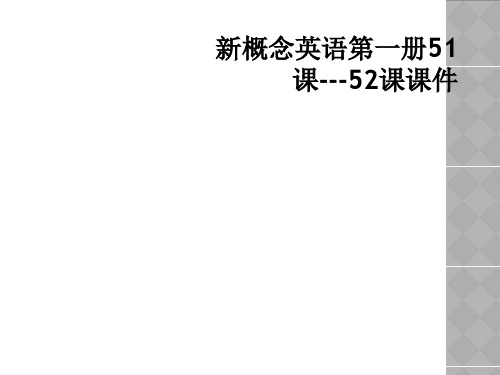
You study at Menghe Secondary School.
3. 经常、习惯、反复做的事情
I wash the dishes every day.
You sometimes take a bus
home. 主语 + V原
一 They usually havVe三lun单ch at
般 11:30.
• It's always warm in _S_e_p_t_e_m__b_e_r_ and _O__c_to__b_e_r_. • It's often cold inN__o_v_e_m__b_earnd it rains sometimes.
Cold
• winter
Very Cold
• It's often cold in_D_e_c_e_m__b_er, J_a_n__u_a_ry__and F_e_b__ru_a_r_y_. • It snows sometimes.
• 常与always, often, never, usually, sometimes, every day等连用。
1. 客观事实
I am Lily. We are boys.
The moon goes round the earth.
2. 符合现在事实情况
You are 13. He is a student.
always, often, sometimes, everyday...
谢谢!
Yes, it sometimes snows in winter.
Listen to the tape and answer these questions:
1.Where and what do they talk about?
3. 经常、习惯、反复做的事情
I wash the dishes every day.
You sometimes take a bus
home. 主语 + V原
一 They usually havVe三lun单ch at
般 11:30.
• It's always warm in _S_e_p_t_e_m__b_e_r_ and _O__c_to__b_e_r_. • It's often cold inN__o_v_e_m__b_earnd it rains sometimes.
Cold
• winter
Very Cold
• It's often cold in_D_e_c_e_m__b_er, J_a_n__u_a_ry__and F_e_b__ru_a_r_y_. • It snows sometimes.
• 常与always, often, never, usually, sometimes, every day等连用。
1. 客观事实
I am Lily. We are boys.
The moon goes round the earth.
2. 符合现在事实情况
You are 13. He is a student.
always, often, sometimes, everyday...
谢谢!
Yes, it sometimes snows in winter.
Listen to the tape and answer these questions:
1.Where and what do they talk about?
新概念英语第二册lesson51(共24张PPT)

Sentences:
• 1. I love _________________ way. • 2.I went on ___________________
expected. • 3. I sat ________________ get
____________. • 4. Looking around,__________________
a diet? He wrote out a long list of all the foods which were forbidden. Q2: What did Hugh do when the writer entered
his room? Hugh led him into his room and hurried hid a large parcel under his desk. Q3: Why did Hugh say that he had to reward hi to ___________.
Harm set, harm get.
害人害己
reward virtue diet
n./5v[:t/ Fu5daI
/rI5wC :/ Et/ :d/
forbid hurriedelymbarrass /f[/5b5hQrI/dIlm5b
diet n.节食
/'daiət/
forbid v.禁止
/fə'bid/
(forbade, forbidden)
hurriedly /'hʌrɪdlɪ/ adv.匆忙地
n.报偿 n.美德
New words
embarrass /im'bærəs/
guiltily
• 1. I love _________________ way. • 2.I went on ___________________
expected. • 3. I sat ________________ get
____________. • 4. Looking around,__________________
a diet? He wrote out a long list of all the foods which were forbidden. Q2: What did Hugh do when the writer entered
his room? Hugh led him into his room and hurried hid a large parcel under his desk. Q3: Why did Hugh say that he had to reward hi to ___________.
Harm set, harm get.
害人害己
reward virtue diet
n./5v[:t/ Fu5daI
/rI5wC :/ Et/ :d/
forbid hurriedelymbarrass /f[/5b5hQrI/dIlm5b
diet n.节食
/'daiət/
forbid v.禁止
/fə'bid/
(forbade, forbidden)
hurriedly /'hʌrɪdlɪ/ adv.匆忙地
n.报偿 n.美德
New words
embarrass /im'bærəs/
guiltily
- 1、下载文档前请自行甄别文档内容的完整性,平台不提供额外的编辑、内容补充、找答案等附加服务。
- 2、"仅部分预览"的文档,不可在线预览部分如存在完整性等问题,可反馈申请退款(可完整预览的文档不适用该条件!)。
- 3、如文档侵犯您的权益,请联系客服反馈,我们会尽快为您处理(人工客服工作时间:9:00-18:30)。
cold in winter, and it In Beijing, it is _____ snows hot and it ____ usually. In summer, it is ____ often _____. Spring is very ______ and rains short windy there is little rain but it's quite _____and sandstorm Autumn is sometimes there are_________. season the best ______in Beijing. It's very comfortable.
mild [maild] wet [wet]
温和的,温暖的 潮湿的
The weather is mild today.
Her eyes are wet with tears.
season ['si:zən] 季节
Spring and autumn are my favorite seasons.
rise [raiz]
They come ____ from Brazil ____ .
Where do they come from?
It comes _____ from England ______.
They come ____ from Holland ______ .
Where do they come from?
我们有时做家务活。 Sometimes we do housework.
她很少9点以后吃晚饭。 She seldom has supper after 9:00pm. 他上学从不迟到。 He is never late for school.
Fill in the blanks.
rain sandstorm season short windy cold snow hot
season spring summer
climate
months
autumn
winter
•
Present simple tense :一般现在 时,表示通常性、规律性、习惯性的 状态或者动作的一种时态,常与always, often, never, usually, sometimes, every day等连用。
wet
windy
warm
Listen and answer
1. What’s the climate like in England? It’s mild, but it’s not always pleasant. 2. Which seasons does the English man like best? He likes spring and summer. 3. What is the favourite subject of conversation in England? Climate is the favourite subject..
• • • • • • • • mild adj. 温和的,温暖的 [maild] always adv. 总是 north n. 北方 east n. 东方 wet adj. 潮湿的 west n. 西方 south n. 南方 season n. 季节
• • • • • • • • •
best adv. 最 night n. 夜晚 rise v. 升起 early adv. 早 set v. (太阳)落下去 late adv. 晚,迟 interesting adj. 有趣的,有意思的 subject n. 话题;[语法]主语;科目 conversation n. 谈话
New Concept English
Lesson 51
spring
seasons
summer
autumn
winter
summer
winter
spring
autumn
weather
• Teacher's Day
• Women's Day
• Thanksgiving Day
• National Day
• ★subject n. 话题;[语法]主语;科目 • How many subjects do you have in your class? • theme n. 论文,演讲的主题 • topic n. 一篇文章或对话的主题 • ★ conversation n. 谈话(随意的交流) • say:(说话的内容) • speak:(讲话的动作) • talk:(谈话,聊天) • chat:(聊天) • dialog:(对话—有固定的话题)
best [best] 最
conversation [.kDnvə'seiʃən] 谈话
I had a long conversation with your teacher.
I like this film best.
What’s the weather like in England?
cold
set [set]
升起 (太阳)落下去 有趣的
The sun rises in the east
The sun sets in the wast
This is an interesting story.
interesting ['intristiŋ] subject ['sʌbdʒikt]
话题
Let’s change the subject.
What is the climate of Haicheng like? It’s warm in spring and autumn, it’s cold in winter, it’s hot in summer.
Review
windy rain snow country Greece 有风的 下雨 下雪 国家 希腊
September March November
October
May April
• Labors’ Day
• April Fool's Day
• Christmas Day
• New Year's Festival
December
January June
•
Children's Day
Listen to the tape and answer these questions:
• • • •
★wet adj. 潮湿的 all in wet 全身湿透了 damp adj. 潮湿的(表面不干燥) moist adj. 给人湿的感觉
• It's very wet.
• • • • • • • • • •
good 好 better(比较级) best(最高级) Which season do you like best? I like spring and summer best. Because the days are long and the nights are short. The sun rises [’raiziz] early and sets late. I don't like autumn and winter. Because the days are short and the nights are long. The sun rises late and sets early.
• favorite特别喜欢的人(或物)
• This is our favorite subject. • This is our favorite subject of conversation. • Climate is our favorite subject of conversation.
Where do they come from?
Itcomes _____ from Spaiom Russia _____ .
Review
spring summer autumn winter weather warm climate pleasant 春天 夏天 秋天 冬天 天气 温暖的 气候 宜人的
It comes _____ from France _____.
It comes _____ from Italy ____ .
Where do they come from?
It comes _____ from Germany _______.
They come ____ from Norway ______ .
north
英国:大不列巅及 北爱尔兰联合王国 England 英格兰 Scotland 苏格兰 Northern Ireland 北爱尔兰 Wales 威尔士
Ireland 爱尔兰
west
east south
Where do they come from?
the U.S. It comes _____ from_______.
1.Where and what do they talk about? 2.How many months are there in spring? What are they?
1.Where do you come from?
I come from________.
2.What’s the weather like in_________? It’s ____.
在描述一个动作多久发生一次时,可以用以下这些词:
every day always often sometimes seldom never
我们每天都喝牛奶。 Every day we drink milk. 我们总在下午上英语课。 We always have English classes in the afternoon. 她通常下课后打篮球。 She usually plays basketball after school. 他经常坐公共汽车上学。 He often goes to school by bus.
mild [maild] wet [wet]
温和的,温暖的 潮湿的
The weather is mild today.
Her eyes are wet with tears.
season ['si:zən] 季节
Spring and autumn are my favorite seasons.
rise [raiz]
They come ____ from Brazil ____ .
Where do they come from?
It comes _____ from England ______.
They come ____ from Holland ______ .
Where do they come from?
我们有时做家务活。 Sometimes we do housework.
她很少9点以后吃晚饭。 She seldom has supper after 9:00pm. 他上学从不迟到。 He is never late for school.
Fill in the blanks.
rain sandstorm season short windy cold snow hot
season spring summer
climate
months
autumn
winter
•
Present simple tense :一般现在 时,表示通常性、规律性、习惯性的 状态或者动作的一种时态,常与always, often, never, usually, sometimes, every day等连用。
wet
windy
warm
Listen and answer
1. What’s the climate like in England? It’s mild, but it’s not always pleasant. 2. Which seasons does the English man like best? He likes spring and summer. 3. What is the favourite subject of conversation in England? Climate is the favourite subject..
• • • • • • • • mild adj. 温和的,温暖的 [maild] always adv. 总是 north n. 北方 east n. 东方 wet adj. 潮湿的 west n. 西方 south n. 南方 season n. 季节
• • • • • • • • •
best adv. 最 night n. 夜晚 rise v. 升起 early adv. 早 set v. (太阳)落下去 late adv. 晚,迟 interesting adj. 有趣的,有意思的 subject n. 话题;[语法]主语;科目 conversation n. 谈话
New Concept English
Lesson 51
spring
seasons
summer
autumn
winter
summer
winter
spring
autumn
weather
• Teacher's Day
• Women's Day
• Thanksgiving Day
• National Day
• ★subject n. 话题;[语法]主语;科目 • How many subjects do you have in your class? • theme n. 论文,演讲的主题 • topic n. 一篇文章或对话的主题 • ★ conversation n. 谈话(随意的交流) • say:(说话的内容) • speak:(讲话的动作) • talk:(谈话,聊天) • chat:(聊天) • dialog:(对话—有固定的话题)
best [best] 最
conversation [.kDnvə'seiʃən] 谈话
I had a long conversation with your teacher.
I like this film best.
What’s the weather like in England?
cold
set [set]
升起 (太阳)落下去 有趣的
The sun rises in the east
The sun sets in the wast
This is an interesting story.
interesting ['intristiŋ] subject ['sʌbdʒikt]
话题
Let’s change the subject.
What is the climate of Haicheng like? It’s warm in spring and autumn, it’s cold in winter, it’s hot in summer.
Review
windy rain snow country Greece 有风的 下雨 下雪 国家 希腊
September March November
October
May April
• Labors’ Day
• April Fool's Day
• Christmas Day
• New Year's Festival
December
January June
•
Children's Day
Listen to the tape and answer these questions:
• • • •
★wet adj. 潮湿的 all in wet 全身湿透了 damp adj. 潮湿的(表面不干燥) moist adj. 给人湿的感觉
• It's very wet.
• • • • • • • • • •
good 好 better(比较级) best(最高级) Which season do you like best? I like spring and summer best. Because the days are long and the nights are short. The sun rises [’raiziz] early and sets late. I don't like autumn and winter. Because the days are short and the nights are long. The sun rises late and sets early.
• favorite特别喜欢的人(或物)
• This is our favorite subject. • This is our favorite subject of conversation. • Climate is our favorite subject of conversation.
Where do they come from?
Itcomes _____ from Spaiom Russia _____ .
Review
spring summer autumn winter weather warm climate pleasant 春天 夏天 秋天 冬天 天气 温暖的 气候 宜人的
It comes _____ from France _____.
It comes _____ from Italy ____ .
Where do they come from?
It comes _____ from Germany _______.
They come ____ from Norway ______ .
north
英国:大不列巅及 北爱尔兰联合王国 England 英格兰 Scotland 苏格兰 Northern Ireland 北爱尔兰 Wales 威尔士
Ireland 爱尔兰
west
east south
Where do they come from?
the U.S. It comes _____ from_______.
1.Where and what do they talk about? 2.How many months are there in spring? What are they?
1.Where do you come from?
I come from________.
2.What’s the weather like in_________? It’s ____.
在描述一个动作多久发生一次时,可以用以下这些词:
every day always often sometimes seldom never
我们每天都喝牛奶。 Every day we drink milk. 我们总在下午上英语课。 We always have English classes in the afternoon. 她通常下课后打篮球。 She usually plays basketball after school. 他经常坐公共汽车上学。 He often goes to school by bus.
